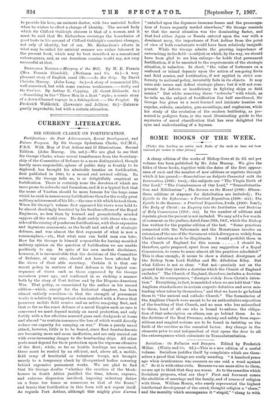SOME BOOKS OF THE WEEK.
[Under this heading we notice such Books of the week as have not been reserved for review in other forms.] A cheap edition of the works of Bishop Gore at 2s. 6d. net per volume has been published by Mr. John Murray. We give the titles of these books, together with the dates of the first appear- ance of each and the number of new editions or reprints through which it has passed :—Dissertations on Subjects Connected with the Incarnation (1895: two),—the subjects are "The Virgin Birth of Our Lord," "The Consciousness of Our Lord," "Transubstantia- tion and Nihilianism" ; The Sermon on the Mount (1896: fifteen : three editions at sixpence for distribution are included) ; The Epistle to the Ephesians: a Practical Exposition (1898: six); The Epistle to the Romans: a Practical Exposition, 2 vols. (1900: four) ; The Body of Christ : an Enquiry into the Institution 'and Doctrine of Holy Communion (1901: six). In the number of editions and reprints given the present is not included. We may add a few words of comment on the preface, dated June 29th, 1907, which the Bishop has written for the popular edition of the last. "Some practices connected with the Tabernacle and the Monstrance involve an extension of the use of the Sacrament which diverges so widely from Christ's intention as to be illegitimate. I would prohibit them in
the Church of England for this reason I should be, therefore, quite prepared, apart from any suggestion of a Royal Commission, to cause to cease almost all the practices scheduled." This is clear enough; it seems to show a distinct divergence of the Bishop from Lord Halifax and Mr. Athelstan Riley. But what follows is not so clear. "But not—precisely not on the ground that they involve a doctrine which the Church of England excludes." The Church of England, therefore, includes a doctrine which, in its consequences, "diverges widely from Christ's inten- tion." Everything, in fact, is unsettled when we are told that "the Anglican standards are in certain respects defective and even mis- leading when taken by themselves," and that we have to go behind them to "the ancient and catholic Church." The formularies of the Anglican Church were meant to be an authoritative exposition of the teaching of that Church, and no man who has subscribed to them, least of all one who is bound to enforce the obliga- tion of that subscription on others, can go behind them. As to the doctrine of the Real Presence, sobriety and safety from super- stitious and magical notions are to be found in insisting on the faith of the receiver as the essential factor. Any change in the elements prior to and independent of that opens the door to all the extravagances which culminate in Transubstantiation.






































 Previous page
Previous page